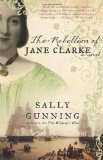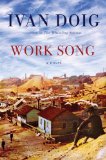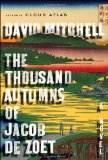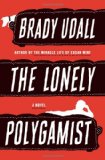Category: Books & Learning
Book Review: “The Rebellion of Jane Clarke” by Sally Gunning
August 24, 2010 { Book Reviews }In this quiet and personal historical coming of age tale, Sally Gunning shows us New England on the brink of revolution through the eyes of a young and slightly rebellious woman. Protagonist Jane Clarke’s domestic issues of justice and truth mirror those making a loud entrance onto the international stage.
This Early Reviewer selection from LibraryThing was provided by William Morrow Publishing.
Book Review: “Work Song” by Ivan Doig
July 8, 2010 | 1 comment { Book Reviews }The third in a series of novels following the adventures and misadventures of Morrie Morris, Ivan Doig’s newest yarn maintains his hallmark breezy, historically-rich Western style, even if the payoff isn’t terribly memorable.
Book Review: “The Thousand Autumns of Jacob de Zoet” by David Mitchell
June 28, 2010 | 1 comment { Book Reviews }In The Thousand Autumns of Jacob de Zoet, author David Mitchell seems like he’s telling us a secret. A long secret. A long, human secret about a secret land in a time shrouded by history and distance. His latest novel leaves behind the clever tricks of structure of his earlier works in favor of a purer, undistracted treatise on the human condition, nestled into a very unique historical setting.
At the dawn of the 19th century, a group of ragtag, conniving Dutchmen working for the East India Company make up the only westerners that can even steal glimpses of the forbidden Japanese Empire. From a tiny, walled island called Dejima outside of Nagasaki, the handful of Europeans trade and cheat, maximizing profits from copper, camphor and other Japanese goods while occasionally inadvertently enriching the East India Company as well.
Book Review: “The Lonely Polygamist” by Brady Udall
May 1, 2010 { Book Reviews }Brady Udall is trying to stay out of the way. His new novel is about a Fundamentalist paterfamilias with 28 kids and 4 wives, naively blundering into motley hijinx and hatching adolescent longings for the boss’ wife, backing himself into a web of lies and an imminent family showdown that builds up for most of the book’s nearly 600 pages.
In a world with so many characters and so much potential for emotional damage, Udall steers the narrative ship by removing himself from the thread: the momentum of the whirling plot creates its own little galaxy and he remains predominantly hands-off with his three main narrators (Golden, the patriarch; Rusty, the uncharismatic and totally sympathetic, ignored kid; Trish, the youngest and most, frankly, dull of the wives).
Of course, this is fiction, so beyond noting the naturalistic style of writing, claiming that Udall is not present is fallacious. But what he bends backwards to do, with eerie success, is the avoidance of even the literary equivalent of an subtle eyebrow raising: never once does the remotest sense of moral judgment leak into the book that isn’t a product of a specific character’s outlook.
Book Review: “The Lost City of Z” by David Grann
April 27, 2010 { Book Reviews }It’s an addictive genre and it is hugely popular these days: adventure meets multidisciplinary pop-sci meets biography. The survey style of writing that’s hard to resist and, when well executed, provides a page-turning synthesis of a given topic. Epitomized by Simon Winchester in his bestsellers Krakatoa and The Crack in the Edge of the World, the approachable, storytelling approach to nonfiction tends to lend itself well to journalists and generalists: here breadth works better than depth.
The Lost City of Z tells of Percy Fawcett, Victorian explorer extraordinaire, Royal Geographic Society hotshot and generally immortal geographer of the Amazonian basin. Fawcett represented the last romantic gasps of the centuries-long quest to find something like the mythical golden city of El Dorado. His life’s obsession to be the first to discover proof of an enlightened and materially affluent civilization in the unexplored jungle ended with his mysterious disappearance and the spawning of a new obsession, a shared obsession for all those who sought to uncover what happened to him during the following decades.
Book Review: “The Left Hand of Darkness” by Ursula K Le Guin
April 14, 2010 | 1 comment { Book Reviews }If you can shake off the burdens of its serious themes—gender, sexism, totalitarian political regimes—The Left Hand of Darkness is actually an interesting story, one that, as Le Guin’s own Introduction explains, pushes the envelope of the science fiction genre. The critics seemed pleased with Le Guin: the 1969 novel won both the Hugo and Nebula Awards. But does the story age well? Its treatment of feminism, as well as the thinly-veiled parallels between the planet Winter’s fantasy politics and our own earthbound nations keep peg it squarely in its origins: the late 1960s.
Vetiver: Miraculous grass smells fantastic, provides environmental benefits
April 5, 2010 { Books & Learning }
Vetiver: it’s present in nearly 90% of western perfumes[wiki] and its aroma is a complex weave of (I’m smelling some right now) smoke, earth, wood, secrets, calm, nuance, sap. It has almost no edges to its smell; it’s a viscous, amber syrup in its distilled form. You feel like you could almost put it on pancakes.
But vetiver also provides excellent erosion control, serves as a natural filter for industrial toxins, is non-invasive, antiseptic, and, possibly, anti-inflammatory in a way that I find intriguing.
Photo by Treesftf
Reading, eBooks, and what I think of the iPad versus the Kindle
April 3, 2010 | 6 comments { Books & Learning, Geek }
The story begins: I once had an Amazon Kindle. I love to read and I love technology. It seemed like a good match. Except I kind of hated it.
Enter the iPad, with its iBooks application, and then re-enter Amazon with a Kindle reader for the iPad. Then there’s Kindle on iPhone and other options on the iPad, and, holy moly, what a morass of possibilities.
Planets Everywhere: Building our model solar system
April 1, 2010 { Books & Learning, Geek, Life }
Things rarely get me unreservedly excited in my ripe old age. I’m thinking excited in terms of the way I felt about birthday presents when about ten. When I could, I’d stack them in order and slowly open each one and try to stretch out the event as long as possible, coaxing open paper and laboriously untying ribbons. The kind of excitement that actually makes me slow down instead of speeding up, because it’s just that good that I don’t want it to end.
We are building an Orrery, a brass-and-gears wonder of a mechanical thing (and heavy!) that models the planets in the solar system. I can’t stand how much fun I’m having with this. Even cutting the pieces out of their wretched blister pack and setting them out on the table (set screws, gears, axles, planets) is bliss.
Book Review: “The Best American Science Writing 2009″ ed. Natalie Angier
March 25, 2010 { Book Reviews }Houghton Mifflin’s annual “Best American” series is getting far-flung. In 1915, the first Best American Short Stories anthology was published. These days, you can get a yearly dose of Best Comics, Best Crime Reporting, Best Medical Writing, Best Short Plays, et cetera. Last year I read The Best American Science and Nature Writing 2008 and was pleased. This year, I just finished reading The Best American Science Writing 2009.
Like any anthology, this one has its ups and downs. It made for a quick read and a couple of ah-ha moments, but if you miss out on it, you won’t be hopelessly left behind.
From the Archive
From the archive, a few random posts that you might not have seen before.
- Oct 3, 2008 { Geek, Internets, Life }
It's a Party: Tuesday, Oct. 7 at 5:30pm - Nov 20, 2007 { Geek }
links for 2007-11-20 - Jul 10, 2007 { Life }
Pointy Birds Debut Photos - Jan 15, 2007 { Internets }
Today's xkcd Comic Priceless







